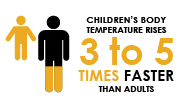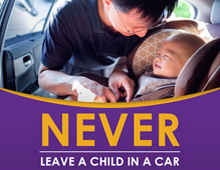Never Leave Unattended Children in a Car
Published: 07/23/2019
LOOK BEFORE YOU LOCK
As temperatures begin to rise, we want to remind the community of the importance of never leaving unattended children in a car. During the sweltering heat of summer, temperatures in a car can reach up to 150 degrees, an incredibly dangerous environment for anyone, but especially for children. A child can die when his/her body reaches a core temperature of 107 degrees and children’s body temperatures rise 5 times as fast as an adult’s does. Heat stroke is the leading cause of non-crash, vehicle-related deaths in children under 15.



In the Fall of 2001 the Governor of California signed into law Senate Bill 255, also known as Kaitlyn’s Law. Named for Kaitlyn Russell, a six-month old who died after being left by a babysitter in a parked car for more than two hours, the law makes it illegal for a child to be left unattended in a motor vehicle. California Vehicle Code 15620 states that it is illegal to leave a child six years of age or younger unattended in a motor vehicle without the supervision of someone who is 12 years or older when: there are conditions that present a significant risk to the child's health or safety, and when the vehicle's engine is running and/or the vehicle's key is in the ignition.
A break in a daily routine can lead to a momentary lapse in memory, that causes caretakers to forget that they have little ones in the back seat. The number one tip to prevent this from happening is for parents and caretakers to accept that it can happen to anyone, and ACT to avoid this situation.
A
AVOID HEATSTROKE:
Avoid heatstroke-related injury and death by never leaving your child alone in a car, and make sure to keep your car locked when you are not in it so kids do not get in on their own, especially when loading and unloading.
C
CREATE REMINDERS:
Create reminders by putting something in the back of your car next to your child such as a briefcase, a purse or a cell phone that is needed at your final destination. This is especially important if you are not following your normal routine.
T
TAKE ACTION:
If you see a child alone in a car, call 911. Emergency personnel want you to call. They are trained to respond to these situations. One call could save a life.


